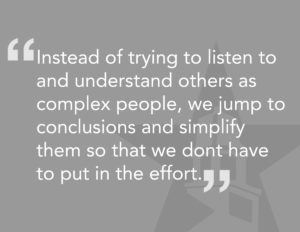These days, it seems like every major news or media outlet is trying to paint the world in black and white. It feels like any issue, no matter how complex or multifaceted, can be reduced to a two sided, liberal versus conservative debate. This kind of media has influenced our politics and even the way we hold discussions. With the way we talk about anything, it seems like we are desperate to put people into boxes. The moment someone mentions they’re pro-life, we automatically assume that they’re Republican, conservative, and don’t believe in climate change. I have no idea how we got from abortion to the environment, but it happens all the time.
 We live in an age of associations, where it is easy to reduce people down to a stereotype. Instead of trying to listen to and understand others as complex people, we jump to conclusions and simplify them so that we don’t have to put in the effort of understanding. Dean Jordan described this idea in chapel recently. He said that when we refuse to listen to what others are actually saying to us and instead focus on what we think they should be saying, we’re essentially saying, “Back in the box, I don’t care.” We are so quick to classify people as conservative rednecks or liberal snowflakes. What about the conservative snowflakes or the liberal rednecks? Better yet, why is it a dichotomy? Who says there can’t be liberal hail, sleet, and freezing rain as well as snowflakes?
We live in an age of associations, where it is easy to reduce people down to a stereotype. Instead of trying to listen to and understand others as complex people, we jump to conclusions and simplify them so that we don’t have to put in the effort of understanding. Dean Jordan described this idea in chapel recently. He said that when we refuse to listen to what others are actually saying to us and instead focus on what we think they should be saying, we’re essentially saying, “Back in the box, I don’t care.” We are so quick to classify people as conservative rednecks or liberal snowflakes. What about the conservative snowflakes or the liberal rednecks? Better yet, why is it a dichotomy? Who says there can’t be liberal hail, sleet, and freezing rain as well as snowflakes?
I think what this tendency really reflects is our exhaustion. We know that issues are so complex and it’s nearly impossible to understand everything about them. Because we have so much access to social media, we are flooded with information every time a new problem arises, which is about every 30 seconds. It would take so much effort, mentally and emotionally, for us to understand and be empathetic to all sides of any issue we encounter. It is much easier to just put things in black and white. Listening to those who disagree with us is really difficult, especially when we feel strongly about something, but it is possible. The most trying part of this process occurs when we feel threatened by another person’s view. There are some issues on which we believe the stance we have chosen is the right one, and others who feel differently are uneducated or just plain wrong. Sometimes, people really are uneducated. That doesn’t mean we can condescend to them and make them feel stupid. Instead, we can listen to their views, even if some of their facts aren’t quite straight, because they are still an intelligent, thinking human being with reasons for believing what they do. Sometimes we feel like people are just plain wrong. That doesn’t mean we have to correct them right then and there. There’s even the possibility that we ourselves are wrong or can learn something.
 It’s not about who’s right and who’s wrong when we’re having conversation, it’s whether we value the thoughts and opinions of the human sitting across from us. We are not in the middle of a competition over whose political views constitute absolute truth, we are living in a community with other living, thinking human beings who deserve to be loved and understood. Empathy hurts, and understanding is exhausting. But it is a measure of how much we value each other that we give empathy, understanding, and love anyway.
It’s not about who’s right and who’s wrong when we’re having conversation, it’s whether we value the thoughts and opinions of the human sitting across from us. We are not in the middle of a competition over whose political views constitute absolute truth, we are living in a community with other living, thinking human beings who deserve to be loved and understood. Empathy hurts, and understanding is exhausting. But it is a measure of how much we value each other that we give empathy, understanding, and love anyway.
Sydney is a sophomore majoring in Spanish and intercultural studies.
